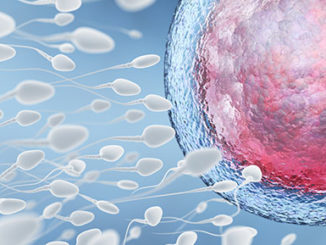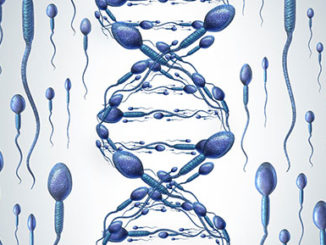Epigenetic inheritance, especially transgenerational epigenetic inheritance, is an important topic in epigenetic research. Do we pass down epigenetic marks to our children as a result of our lifestyle or behavior? Can this occur even long before conception and during pregnancy? Epigenetic studies suggest that the actions of a future mother or father can have long-lasting health effects on their children for years to come.
Studies show that certain DNA methylation marks can survive genome-wide reprogramming and be inherited. For example, a father’s exposure to phthalates could adjust epigenetic marks on sperm DNA and impact a couples’ ability to have children. A father’s diet and supplement intake could also influence his child’s mental fitness.
Mothers can influence epigenetic marks on their offspring’s DNA as well, changing how their baby will react to stress, whether or not they grow up healthy, and their ability to learn, remember and adapt as adults. The Mediterranean diet during pregnancy was shown to epigenetically reduce a child’s risk of disease.
Explore the ways in which lifestyle and habits of a mother and father – and potentially even grandparents or great-grandparents – may influence the epigenetic marks and health of later generations via epigenetic inheritance.
Check out our comprehensive e-book Epigenetics in Life: What We Eat to learn more about how different foods influence health.
When it comes to reproductive health, it’s no secret that a pregnant mother’s choices and environment can severely impact her child’s epigenetics and health—especially mothers suffering from PTSD. But it turns out fathers who have suffered significant stress early on in their life may also epigenetically impact the physical and mental health of their offspring. It was previously thought that fathers only passed DNA to the mother’s egg during fertilization, but it was recently discovered that sperm also contributes miRNA, [more…]
Exercising your body and your brain are two ways to improve your own health. It’s well known that physical and mental activity can boost learning ability and reduce risk for diseases such as Alzheimer’s. But, could doing so also directly benefit your future children? New research in Cell Reports indicates that a child’s capacity for learning could actually be boosted as a result of the physical and mental exercise that their parents carried out before they were born. Researchers are [more…]
There is strong evidence that suggests certain environmental or lifestyle factors may lead to increased risk of developing chronic diseases. These factors such as diet, behavior, stress, exposure to pollutants, and physical activity have been known to cause epigenetic changes which may be passed down from one generation to the next. It is believed that a father’s exposure to environmental factors can play a role in an offspring’s epigenetic patterns and health. Recent evidence suggests that sperm epigenetic modifications can [more…]
When the Twin Towers came down in 2001, it was one of the most shocking moments in human history. This brazen act of terror traumatized an entire population. For those who lost friends, family, and acquaintances in the tragedy, it was an enormous cause of stress, grief and general departure from a normal state of being. Among the affected, many were pregnant women – some of whom developed PTSD after the incident. As reported in The Journal of Clinical Endocrinology [more…]
Egg cells, or oocytes, are made inside a female’s body before she is even born and they must be kept in a state of equilibrium or stasis during her childhood. Eventually, they can transition to mature eggs when needed as an adult. If the eggs do not go into stasis, however, they will never be able to eventually form into a baby. New research in Nature Structural and Molecular Biology explores the influence of epigenetics on egg cell stasis and [more…]
You might be familiar with the popular epigenetic study that suggests when mother rats lick their pups, they leave epigenetic marks on their babies’ DNA. This, in turn, helps them grow up to be calm adults. On the other hand, pups who receive very little licking, grooming, or nursing from their moms tend to grow up more anxious. It wasn’t their genes that dictated their stressed-out behavior, but their epigenome, which was shaped by the nurturing behavior of their mother [more…]
The Mediterranean diet has been associated with reduced risk of cardiovascular disease, cancer, Alzheimer’s disease, obesity, and metabolic syndrome. Taking this a step further, research is now pointing to the epigenetic benefits abiding by a Mediterranean diet could have while pregnant. The main components of this healthy eating pattern might epigenetically protect the fetus from developing diseases later in life by adjusting what are called histone modifications. Inspired by the ancient communities like Greece, Spain, and Italy, this diet emphasizes [more…]
New epigenetic research conducted by scientists at the University of Massachusetts suggests that a father’s environment can affect the health of his baby via epigenetic marks in his sperm. Specifically, male exposure to phthalates, which are endocrine disruptors found in plastics, personal care products like shaving cream, and in the environment that surrounds us, were found to have an impact on a couples’ success when having children. Led by Richard Pilsner, an environmental health scientist, this ongoing study supported by [more…]
Even though it’s common for expectant mothers to have low vitamin D levels, it’s essential to the health and proper development of the baby. A low amount of vitamin D is associated with poor fetal growth, childhood obesity, bone density, and bone mineral content. Interestingly, key functions of the placenta – like transporting nutrients to the growing baby – are controlled by the expression of genes, which is mediated by vitamin D. Researchers have now discovered that this vitamin might [more…]
Exposure to environmental pollution, such as diesel exhaust or concentrated urban air particles, during pregnancy could increase a child’s risk of developing asthma via epigenetic mechanisms. Recent research in the Journal of Physiology – Lung Cellular and Molecular Physiology suggests that this allergic susceptibility might even be epigenetically passed down for several generations. Asthma forms as a result of the complex interaction between someone’s genes, epigenetic marks, and the environment. Epigenetics, the study of how chemical tags impact the expression [more…]











